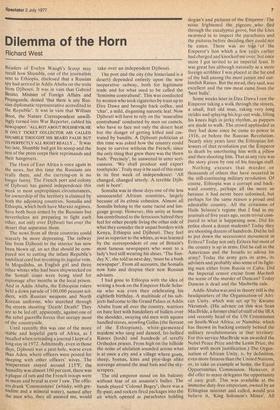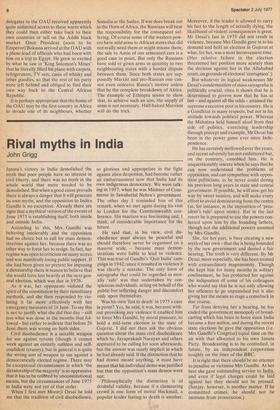Dilemma of the Horn
Richard West
Readers of Evelyn Waugh's Scoop may recall how Shumble, one of the journalists sent to Ethiopia, disclosed that a Russian spy had arrived in Addis Ababa on the train from Djibouti. It was in vain that Gabriel Benito, Minister of Foreign Affairs and Propaganda, denied 'that there is any Rus- sian diplomatic representative accredited to the Republic'. It was in vain that William Boot, the Nature Correspondent unwill- ingly turned into War Reporter, cabled his newspaper: 'ALL ROT ABOUT BOLSHEVIK HE IS ONLY TICKET COLLECTOR ASS CALLED SHUMBLE THOUGHT HIS BEARD FALSE BUT ITS PERFECTLY ALL RIGHT REALLY .., It was too late, Shumble had got his scoop and the rest of the press corps their reprimands and their hangovers.
The Horn of East Africa is once again in the news, but this time the Russians are really there, and the carrying-on is no longer funny. The French port and colony of Djibouti has gained independence this week in most unpropitious circumstances, for ownership of the territory is claimed by both the adjoining countries, Somalia and Ethiopia, which both have Marxist regimes, have both been armed by the Russians but nevertheless are preparing to fight each other, not only over Djibouti but over the desert that separates them.
The news from all three countries could scarcely be more depressing. The railway line from Djibouti to the interior has now been blown up, an act that should be com- pared not to cutting the infant Republic's umbilical cord but to cutting its jugular vein.. In Mogadishu, an English girl and three other whites who had been shipwrecked on the Somali coast were being tried for espionage after months in the local prison. And in Addis Ababa, the Ethiopian rulers held a dawn parade of 100,000 peasant sol- diers, with Russian weapons and North Korean uniforms, who marched through the streets shouting 'Death! Death!' They are to be led off, apparently, against one of the rebel guerrilla forces that occupy most of the countryside.
Until recently this was one of the more stable and hopeful parts of Africa, as I recalled when rereading a journal I kept of a long stay in 1972. Admittedly, even in those days, Djibouti was a pest-hole, worse even than Aden, where officers were posted for sleeping with other officers' wives. The temperature stayed around 115°F, the humidity was almost 100 percent, there was a plague of rats and the French troops were as mean and brutal as ever I saw. The offic- ers drank 'Communistes' (whisky, with gre- nadine and a mineral water), named after the men who, they all assured me, would take over an independent Djibouti.
The port and the city (the hinterland is a desert) depended entirely upon the now inoperative railway, both for legitimate trade and for what used to be called the 'feminine contraband'. This was conducted by women who took cigarettes by train up to Dire Dawa and brought back coffee, and 'chat', a mild, disgusting narcotic leaf. Now Djibouti will have to rely on the 'masculine contraband' conducted by men on camels, who have to face not only the desert heat but the danger of .getting killed and cas- trated by bandits. A Djibouti politician at this time was asked how the country could hope to survive without the French, since the only thing that grew there was the thorn bush, 'Precisely', he answered in utter seri- ousness. 'We shall produce and export toothpicks'. Truly may it be said of this state in its first week of independence: 'All changed, changed utterly. A terrible Djib- outi is born'.
Somalia was in those days one of the less unsuccessful African countries, largely because of its ethnic cohesion. Almost all Somalis belong to the same racial and lan- guage group. However, this unity at home has contributed to the ferocious hatred they feel for other people living the other side of what they consider their unjust borders with Kenya, Ethiopia and Djibouti. They feel just as superior to the whites, as was learned by the correspondent of one of Britain's most famous newspapers who went to a lady's bed still wearing his shoes. 'The Sun- day X', she told us next day, 'must be a bush newspaper'. From all accounts, the Somalis now hate and despise their new Russian advisers.
I had gOne to Ethiopia with the idea of writing a book on the Emperor Haile Selas- sie who was even then celebrating his eightieth birthday. A multitude of his sub- jects had come to the Grand Palace at Addis Ababa from all over the country, warriors on bare feet with bandoliers of bullets over the shoulder, swaying old men with square handled staves, scowling Gallas (the fiercest, of the Ethiopians), white-garmented maidens who sang and danced, fat-bellied Rasses (lords) and hundreds of scruffy Orthodox priests. From high on the hillside the noise of ululation sounded across what is at once a city and a village where goats, sheep, hyenas, kites and piye-dogs alike scavenge around the mud huts and the sky- scrapers.
The old emperor stood on his balcony without fear of an assassin's bullet. The bands played 'Colonel Bogey'; there was a fly-past; and rockets fired packages into the air which opened as parachutes holding slogan's and pictures of the Emperor. The noise frightened the pigeons who fled through the eucalyptus grove, but the kites swarmed in to inspect the parachutes and the pictures before deciding they could not be eaten. There was no "sigh -'of the Emperor's lion which a few yekrs earlier had charged and knocked me over; but once more I got invited to an imperial feast: It was great fun although naturally as a mere foreign scribbler I was placed at die far end of the hall among the most junior and out- landish Rasses. But the mead, they said, was excellent and the raw meat came from the 'best bulls'.
Some weeks later in Dire Dawa I saw the Emperor taking a walk, through the streets, a small, frail old man, taking very long strides and splaying his legs out wide, lifting his knees high in jerky rhythm, as puppets are made' to walk. The crowd applauded as they had done since he came to power in 1916, or before the Russian Revolution. Nearly sixty years later the Ethiopian fol- lowers of that revolution put the Emperor to death by smothering him with a pillow and then shooting him. That at any rate was the story given by one of his foreign staff.
Nothing excuses that murder or thousands of others that have occurred in the still-continuing military revolution. Of course, Ethiopia was a corrupt and back- ward country, perhaps all the more so because it had never been colonised, but perhaps for the same reason a proud and admirable country. All the criticisms of Haile Selassie's regime that I find in my journals of five years ago, seem trivial com- pared to what is happening now. Did his police shoot a dozen students? Today they are shooting dozens of hundreds. Did he fail to put down the secessionist movement in Eritrea? Today not only Eritrea but most of .the country is up in arms. Did,he call in the Americans and the Israelis to. advise his army? Today the army gets its arms, its advisers and probably also some.of its fight- ing men either from Russia or Cuba. Did the Imperial censor excise from Macbeth the scene of the murder of Duncan'? Today Duncan is dead and the Macbeths rule.
Addis Ababa was and in theory Still is the headquarters of the Organisation'of Afri- can' Unity, which was set up"by Kwame Nkrurnah. (His advisor on this was Sean MacBride, a former chief of staff of the IRA and recently head :of the UN Commission on South-West Africa, or Namibia, which has thrown its backing entirely behind the military revolutionaries in that territory. For this service MacBride was awarded the Nobel Peace Prize and the Lenin Prize, the latter with more justification.) The Organ- isation of African Unity, is, by definition, even more fatuous than the United Nations, or, to take an example at home, the Equal Opportunities Commission. However, it did offer to many delegates the opportunity of easy graft. This was available at the immense duty-free emporium, owned by an Ethiopian minister and called, would you believe it, 'King Solomon's Mines'. All delegates to the OAU received apparently quite unlimited access to these wares which they could then either take back to their own countries or sell on the .Addis black market. Once President (soon to be Emperor) Bokassa arrived at the OAU with a plane-load of officials who had been with him on a trip to Egypt. He grew so excited by what he saw in 'King Solomon's Mines' that he literally filled his plane with carpets, refrigerators, TV sets, cases of whisky and other goodies, so, that the rest of his party were left behind and obliged to find their own way back to the Central African Republic.
It is perhaps appropriate that the home of the OAU may be the first country in Africa to invade one of its neighbours, whether Somalia or the Sudan. If war does break out in the Horn of Africa, the Russians will bear the responsibility for the consequent suf- fering. Of course some of the western pow- ers have sold arms to African states that did not really need them or might misuse them; the sale to Amin of our armoured cars is a good case in point. But only the Russians have sold or given arms in quantity to two neighbouring states with a border dispute between them. Since both states are sup- posedly Marxist and pro-Russian one can- not even conceive Russia's motive unless that be the complete breakdown of Africa. The example of Ethiopia seems to show that, to achieve such an aim, the supply of arms is not necessary. Half-baked Marxism will do the trick.



































 Previous page
Previous page